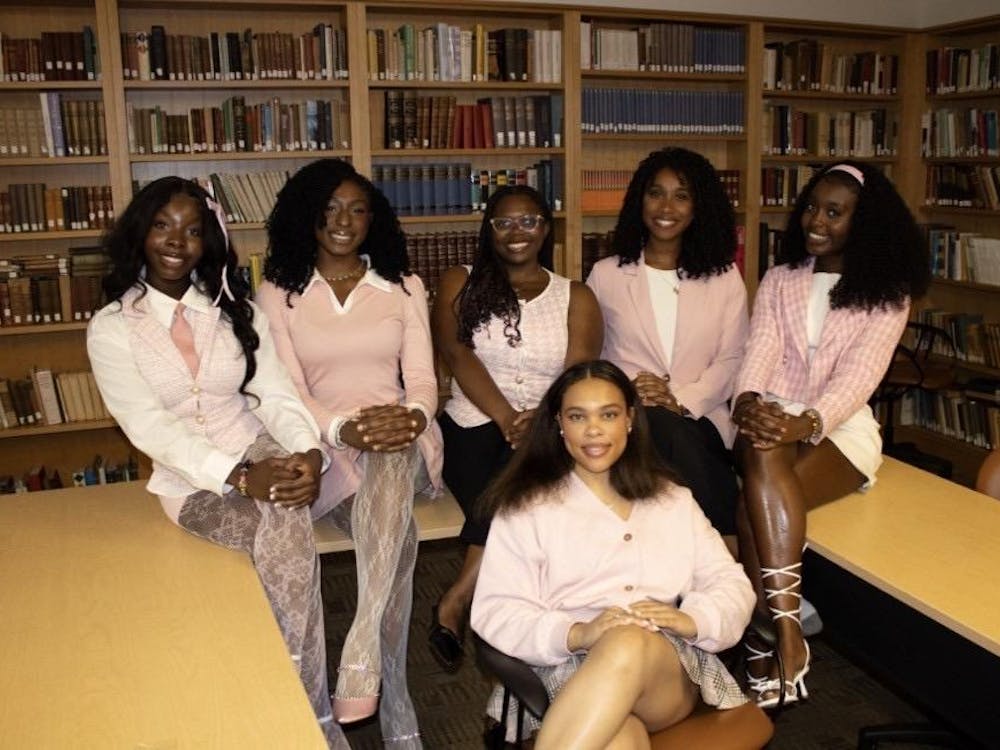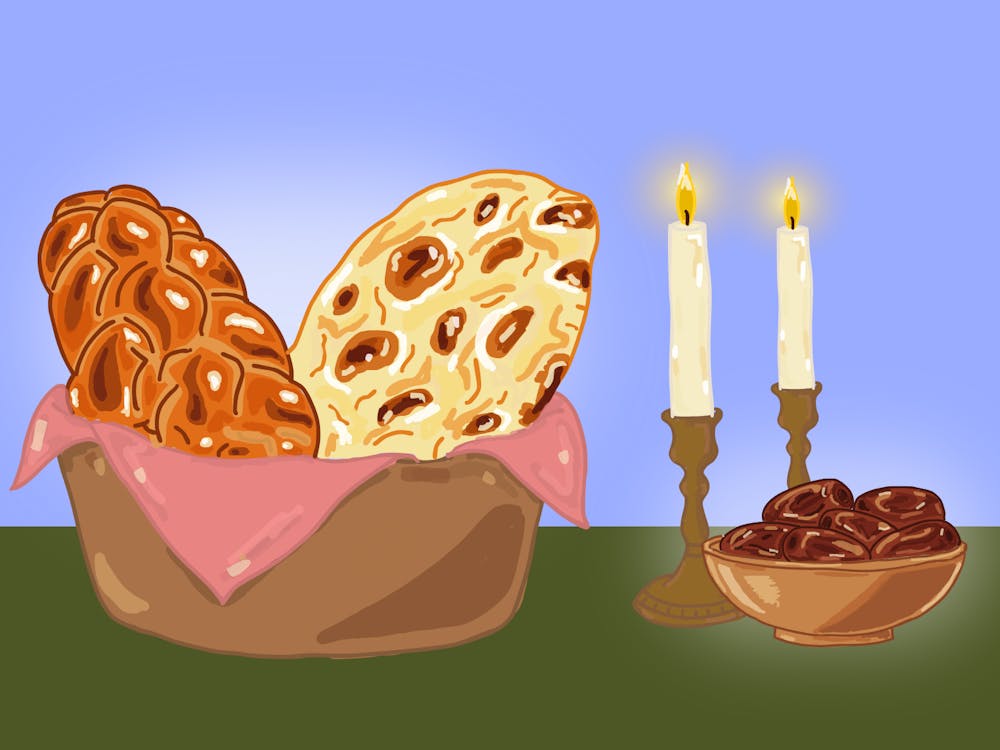Here, you might as well be Lebanese. Light-skinned, pale-eyed people stroll about in American clothes as you stare out at the blue-green expanse that is the Mediterranean Sea. Behind you, a college campus that looks nothing like the Academical Village looms large. And for a moment, you forget that you are a University professor a long way from home.
This scenario could become a reality when University professors have the opportunity to travel far from home with the University's new professor exchange program.
The exchange, directed by University history professors Joseph Kett and Peter Onuf, would allow one American studies professor to travel to the American University of Beirut to teach for either the semester or the year.
The same would apply for an AUB Middle Eastern studies professor who would journey to the University.
The program would be supported by a $125,000 grant from the State Department for a housing stipend and airfare costs. In addition, each professor would receive a normal salary from his own university.
Kett is the man behind the plan. He first introduced himself to the Lebanese landscape and to AUB in 1998 when he traveled to Beirut on a State Department stipend to teach a three-week lecture series.
His travel to AUB was the first time a government-subsidized lecturer had traveled to the city in 14 years.
The university, which was founded in 1868 by Christian missionaries, only recently has emerged from a tumultuous decade of civil war and foreign invasions. In 1984, the American president of AUB, Malcom Kerr, was assassinated in his own office.
But when the dust cleared and a relative peace settled in Beirut, AUB was eager to import American studies experts to fortify its Middle East-slanted history and government departments. The first of these American imports was Kett.
"I was struck that it is an American university but isn't teaching any American history classes," he said.
Kett leans back in his office chair, still musing on an afternoon visit from NBC's "Today" host Katie Couric while munching on his lunch. As he rummages around in his canvas backpack for the rest of his meal, he pulls out a few blond vanilla cookies.
Upon his arrival to AUB, Kett knew he was at an important university. He recalls taking time out to flip through pages of an alumni directory one day. Kett recognized many names of prominent officials and administrators in the Arab world.
It was during Kett's 1999 visit that the great idea struck. In between lectures one day, Kett strode into College Hall, one of the main AUB buildings, and hopped on the elevator. His destination: the history department.
Kett didn't know anyone in the department, but he figured he would find someone. He was right. The first open office door he found belonged to Abdul-Rahim Abu-Husayn.
"I just went in there and said I wanted to run this idea up the flagpole and see if it flies," said Kett, peeling back the plastic bag from his sandwich before taking a resolute bite.
Even Abu-Husayn credits Kett's unexpected visit three years ago with establishing early relations between the two universities.
Last week, Abu-Husayn, who is a professor of history at AUB, flew to Charlottesville for a week's worth of meetings to help firm up plans for the program. He also went sight-seeing and on a search for pecans - one of his favorite foods.
Abu-Husayn, who got his doctorate in Beirut, is an "AUB boy through and through" and specializes in Ottoman history. A sly smile on his lips, he believes AUB has a lot to offer the University and vice versa.
He leans over a cup of coffee at Starbucks, which he declares also exists in Beirut, revealing a red pack of Winston cigarettes in his shirt pocket. For Abu-Husayn, the most important part of the program is to take advantage of the two points of strength at each university. He believes that sharing expertise in Middle Eastern studies at AUB and in American studies at the University will benefit each institution.
Such expertise has been hard to come by in the past. For the fall 2001 semester, the University history department has no courses in Middle Eastern history scheduled. And at AUB, only one of the five history faculty members teaches American history. Most of the other professors teach courses in Lebanese history.
Both Abu-Husayn and Kett admit that one of the possible difficulties in grounding the fledgling program is the two-way exchange. Although an AUB professor will be teaching Arab politics courses at the University next year, no University professor as of yet will be venturing over to AUB.
"We've gotten a lot of soft commitments, but not a lot of hard commitments," Kett said.
William Quandt, vice provost for foreign affairs and a University foreign affairs professor who has been working closely on the project with Kett and Onuf, said the resistance to going to AUB may stem from past conflicts in the Middle East.
But regardless of this hesitancy, Quandt believes that a University professor intrigued by the idea of an adventure in Beirut will soon step up to the plate.
As a former member of the National Security Council during the Carter administration, Quandt's expertise has always been in the Middle East; he eagerly anticipates the arrival of another specialist in the Arab world from AUB.
For Quandt, the AUB exchange project is only one layer of an increasingly friendly relationship between the University and other schools in the Middle East.
An increased number of student exchange programs in the Middle East also might emerge as a result of the program, Quandt said. The University now maintains an exchange program with Israel, but Beirut could be an option in a few years.
Quandt is even working on firming up a proposal with a university in Iran. It would be the first American exchange program with the country.
His arms folded comfortably behind his head, Quandt smiles as he reminisces about his link with Beirut.
While he made frequent trips to Beirut in the 1970s and early 1980s because of his position on the NSC, his last visit was in 1982. This was before fighting broke out between Muslims and Christians in Lebanon.
He was also horrified when Kerr - a personal friend - was killed in 1984.
But Quandt recently returned, traveling with his wife and some friends in 1999 to a very different Beirut.
When he was back he said it was horrifying to see whole neighborhoods demolished.
"But it's so strange, you know, it's like wide-open parking lots in some spots," he said.
For Quandt, one of the draws to teaching at AUB is that it's an easy place to live. Although Beirut is in the heart of the Arab world, there is evidence of Americana on almost every street. Quandt remembers being particularly surprised by a Ben and Jerry's on one side street.
But whether or not a future University exchange professor is an ice cream fan, both Quandt and Kett believe the primary selling point of AUB is that it is "one of the most distinguished universities out there."
As the program directors continue to work out the specifics of the grant with the State Department and try to nail down a University professor to teach at AUB for the 2002-03 academic year, the emphasis is on the fact that the exchange will benefit not one, but two academic institutions.
"We really want to keep this thing in balance - that's really the only way it's going to work," Quandt said.






